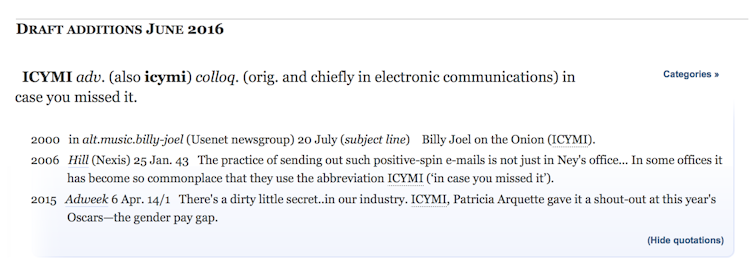The Oxford English Dictionary – the “OED” to its friends – has announced a 2016 update, consisting of over 1,000 new words and word meanings, along with the revision or expansion of over 2,000 entries.
The revisions are not just new words or phrases, like “glamping”, “air-punching”, “sweary” and “budgie smugglers”. The OED has also revised its entry of “bittem”, an obsolete word over 1000 years old, meaning “the keel or lower part of a ship’s hull”.

Where did the new words come from? Some are borrowed from other languages, such as “narcocorrido” (a Spanish word for a traditional Mexican ballad recounting the exploits of drug traffickers), “potjie” (from Afrikaans, a three-legged cast iron cooking pot for use over a fire), and “shishito” (from Japanese, a particular kind of chilli used in Asian cooking).
Some additions are deeply revealing of our modern preoccupations – such as the terms “assisted death” and “assisted dying”. This category also includes the word “agender” (without gender), born of a communal reaction to our deeply binary thinking around gender. The OED dates its use first to the year 2000.
The OED has also added new “initialisms”. To its existing list, which included IMF (International Monetary Fund) and IDB (illicit diamond buyer), it has added ICYMI (in case you missed it), IRL (in real life), IDK (I don’t know), and FFS (look that one up if you don’t know it already!)

Many of the new entries are made by combining words. Some of these fit the definition of “compound words”, that is, words formed by joining two together, such as “air-punching”, “bare-knuckle”, “self-identity” and “straight-acting”. Others are just two words put side-by-side, such as “power couple”, “hockey mum”, “test drive” and “star sign”.

Clearly some of these terms – “budgie smugglers” for instance – have been around for some time. The OED dates this term to 1998. The source is The Games, the Australian mockumentary television series about the 2000 Olympic Games in Sydney.
But to make it into a TV program like this, the term must have already been an established expression in the Australian lexicon. The only corpus of English comparing usage across various countries, the GlowBe corpus, shows how deeply Australian the term “budgie smugglers” is.

The expression “battle of the sexes”, meanwhile, has only just made it into the dictionary. The OED first attests its use right back to 1723.
Then there are the new forms from old stock. For instance, to the verb “exploit,” the OED is adding an adjective (“exploitational”), an adverb (“exploitatively”), and a noun to denote someone who is exploiting someone or something (“exploiter”).
To the verb “to swear” the OED now includes “sweary”, both as noun (a swear word can be called “a sweary”) and adjective (meaning something or someone characterized by a lot of swearing).
Why the wait?
So how do words get into the dictionary? “Lexicographers” – the folk who make dictionaries – add words only when there is evidence of usage over some period of time, and across various contexts of usage. The process for Oxford dictionaries is explained here.
A dictionary can never hold every word of a language. The only estimate I know suggests that well over half the words of English are not recorded by dictionaries. Since this research is based on the Google Books corpus, the data is only from published books in university libraries. We can safely say this figure is very conservative.
Somewhere around 400 million people speak English as a native language. But linguist David Crystal estimates three times as many speak English as an additional language. Thanks to colonization, English is the primary language for countries as diverse as Barbados, Singapore, and Belize.
This latest OED update includes the publication of written and spoken pronunciations for additional English varieties, including those versions spoken in Australia, Canada, the Carribean, Hong Kong, Ireland, New Zealand, the Phillipines, Scotland, Singapore, Malaysia and South Africia. While some of these varieties already had coverage, their presentation has been expanded.
In praise of Singlish
The addition of Hong Kong and Singapore English are entirely new. Speakers of Singapore English, (or “Singlish”) – I count myself as a reasonable speaker of this dialect – will be delighted to see the inclusion of words such as “ang moh” (a light-skinned person of Western origin), “Chinese helicopter” (a derogatory term for a Singaporean whose schooling was conducted in Mandarin Chinese and whose knowledge of English is limited), “killer litter” (objects thrown or falling from high-rise buildings, endangering the people below) and “shiok” (an expression of admiration).
If you think English belongs to Anglos, then you can start by banishing the word “yum cha” from your vocabulary. For a good laugh at Australian English, and the Indian variety, try this series “How to speak Australians”, from the “Dehli Institute of Linguistics”.
By adding the “World Englishes” to the entries on British and American English, the OED has opened a pandora’s box. For instance, read the OED’s explanation for choosing “White South African English” as the model to represent their entries on South African English.
Changes to the OED remind us that a language is not a fixed entity. Not only is English constantly changing, but its boundaries are fluid.
Languages are open and dynamic: open to other dialects and their many and varied users. Therein lies both the power and beauty of language.

